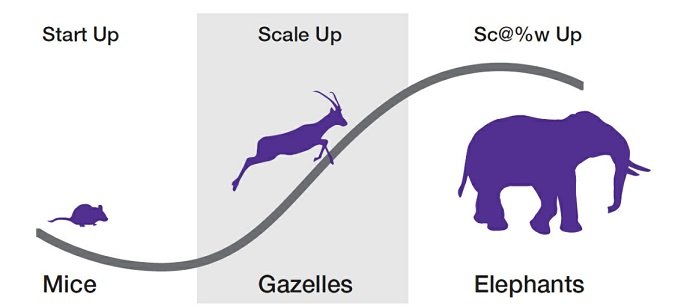
Is deflation always bad?
Sometimes I make it sound like it's always a terrible thing no matter what, right? At the same time, deflation is the defining characteristic of Bitcoin that every maximalist points to when making the point of superiority.
- 21 Million
- 21 Million
- 21 Million
So eventually, yes, Bitcoin's deflationary model and toxic cultish static ecosystem will eventually come back to bite it in the ass. However, that's not going to happen until the entire legacy economy is begging for its life, so... maybe that's kind of the point, eh?
So why is deflation so terrible?
Deflation makes currency worth more money, which many assume is a good thing. However, every economist in existence knows how terrible deflation is on a macro scale. You never want your money to gain value, because if it gains value people will start to horde it (like Gold and Bitcoin). HODLing is terrible for fully functioning economies.
If people horde money, the river of the economy dries up. Similarly, if we think about the economy as an engine and money as the oil, removing the oil from the engine will seize the economy and incur massive damage to it.

It is a known economic fact that bad money will ironically drive out good money from circulation. If one has the option to spend 'bad' money instead of 'good' money, most people will choose the spend the 'bad' money because it is losing value (a liability) and they need to get rid of it. Meanwhile, the good money stays out of circulation as a store of value until the rare occasion that it needs to be liquidated for bad money.
This is why it is so funny to watch crypto nerds rage about Dogecoin and Shiba Inu. Very few people have time to research and understand these economic principals. In our minds, these "shitcoins" should disappear from the ecosystem because they are shitcoins. Why aren't these shitcoins dying already? Obviously they should die!
Anyone who's studied Gresham's Law knows that's not how money works. Community trumps everything. If a community will use the currency, then it will get used. The bad quality of the money ironically makes it get used even more than technically superior versions.
Other comments about deflation.
When people hear that the value of their money is going to go up, they automatically assume that is a good thing. What the vast majority of the rabble do not realize is that if the value of money goes up:
- employers have to lay off workers.
- banks are less willing to give out loans.
- people who already owe loans: now owe even more value back.
- exponentially more people will default on their loans.
- banks are less willing to give out loans, again (deflation death-spiral).
- velocity of money drops off a cliff and the economy seizes.
- demand goes down.
- production goes down.
- wages go down.
- rinse and repeat; all these things amplify each other.
Again, it is a known fact that deflation is bad, but don't try to argue with a maximalist on the issue, because they are full-on 100% delusional. You can't change their mind just like you couldn't change any other cult member's mind.
The truly spectacular thing about Bitcoin is that even though it makes a terrible currency it is a superior stand-in as a beacon of trust and security all throughout the globe. This is a statement I repeat constantly. Bitcoin is not so much a store of value as it is a store of trust. Trust is in short supply these days so the value of Bitcoin continues to rise exponentially as we enter a new decentralized digital ecosystem that depends on the existence of these uncensorable pillars.
The one advantage Bitcoin has in terms of deflation is that inflation requires a governance structure in order to distribute the money to the community. By not having a governance structure (except for miner's whose sole purpose is to secure the network) Bitcoin becomes exponentially more difficult to hack (especially social hacking). This is because there is nothing there to hack in the first place.
Compare this with DPOS and HIVE: we've already been hacked in the most obvious way (ninjamine), but we are still standing strong, and have largely corrected the issue. HIVE is taking a much bigger risk than Bitcoin, and that's okay. With great risk comes the chance for a much greater reward.

Okay, so in what context is deflation a good thing?
Ragnarok makes an excellent example. Normally a CCG game like this would attempt to get as many users as possible. This is how all games before it were able to accumulate the most value possible. Ragnarok is flipping that concept on its ear by hard-capping the number of cards in circulation.
The point of Ragnarok isn't to get as many players as possible, it's to lure an elite squad of professional gamers here and create a spectator sport on the blockchain that we can all watch and bet on. It is in this way that we can see that a deflationary ecosystem is the perfect fit for a project like Ragnarok.
If the entire point of your network is to not expand, deflation makes a lot of sense, because deflation makes expansion (inflation) and growth more difficult. Instead, what will end up happening is that the good players will end up forcing the bad players to quit on a statistical level, leaving only good players duking it out for those massive yearly prize pools. Should be a very interesting and unique system.

What about resource credits?
Ah, yes, the title of the post: I finally got there.
I bet very few people here have considered just how deflationary Hive's resource credits actually are. After all, you get them for free, and they are abundant. How could that possibly be deflationary?
Allow me to explain:
The best way to explain this concept is to compare Hive with Ethereum. How does Ethereum work? In order for your data to be stored on-chain for all time one must pay a fee to the miners. After all, those miners are the ones storing the data for all time of their nodes, so this is fair. Blockchains aint cheap, they are very inefficient and expensive compared to centralized solutions.
But how does Hive work?
On Hive, we are legit yield farming our bandwidth as a secondary resource. The only way to yield farm RCs is it power up Hive. This has many long-term ramifications that have largely gone unconsidered by the community because "who cares".
These are reactive ecosystems, and we tend to deal with problems as they arise, rather than dedicating precious resources to trying to prevent things that may or may not ever happen. We let the bad thing happen first, then we fix it. That's just how it is 99% of the time. There are arguments to be made for both reactive and proactive game theory.
But how does that make RCs deflationary?
Oh, you'll see. You'll see damn quick when RCs go from a value of $0 to a value of literally any other number. $0.000000001? Yep, that'll do it. Once a market exists where entities are willing to pay for RCs, the entire game changes. This will not happen until we face scaling issues and the blocks begin to fill up. In addition, certain dapps will begin to realize that RCs can be used as a kind of alchemy that creates other assets worth more than the value of the RCs itself. Once that happens Pandora's Box really gets opened.

I'm sorry, I still don't understand how RCs are deflationary.
Truly, this is a difficult concept to explain! Everyone is going to be hording Hive, because Hive is yield farming 100% of the bandwidth on Hive. See where this is going? Now we have two currencies: Hive and RCs. One of these currencies is "good" money (Hive) and one of them is "bad" money (RCs). So eventually, RCs will replace the currency we actually use to transfer value to and from each other, and we'll be right back where Bitcoin and Ethereum are: charging users money directly to store data on the chain.
However, Hive becomes a bit superior to that, because imagine if there was some other asset that allowed you to yield farm Bitcoin or Ethereum as some kind of weird secondary asset. That's what Hive is. It's like this master-governance-coin that dominates the bandwidth coin. Imagine if there was a coin better than Bitcoin that actually farmed Bitcoin directly. That's what Hive is, in the context of Resource Credits.
No, @edicted, you sound like a crazy person.
Hm yes, it does sound far-fetched, doesn't it? But I'm still not done making my main point yet, so let me get to it.

Here is the main argument:
Look at dapps and tokens on Ethereum. How many times have we seen something on Ethereum that gets totally FUCKED because the price of Ethereum goes up, and therefore gas prices go up? How many times has a project on Ethereum been gutted because of the gas prices of Ethereum? We see this happen over and over and over again. Building on Ethereum is risky and your business model must be such that the dapp must be able to sustain higher and higher gas prices.
Now the question we must ask ourselves is: is this actually a bad thing?
Isn't it a GOOD thing that dapps on Ethereum are constantly in competition and only the strong survive? Isn't it good that only the most efficient protocols will be built and implemented there? Surely, there are arguments to be made in both cases.
Now for the kicker: HIVE.
What happens on Hive when a dapp launches here and it needs to pay for bandwidth? All that dapp has to do is buy enough Hive to function, and there's a good chance that dapp will continue to function forever without having to worry about gas costs. Again, really think about this issue. These are very significant tokenomics.

Hive has this very weird system of yield farming bandwidth, and if you actually think about how this works on a macro scale and extrapolate into the future, we get some very strange results.
We can think of Resource Credits as a certain kind of job security on Hive. All a dapp has to do is buy enough Hive, and you'll have enough bandwidth to operate forever, how cool is that?!
Well, the reason why it's theoretically not cool is that once RCs on Hive start running dry and becoming scarce, these bandwidth subsidies could very much hurt the chain. Imagine dapps that aren't very good have a ton of Hive, and thus are hogging a ton of bandwidth and using every last drop of that bandwidth. There's nothing we can do. They bought the Hive, so therefore healthy competition for the bandwidth resource is eliminated. This is a problem that Bitcoin or Ethereum will never have, because they do not use a second layer token for bandwidth.
Better dapps and more skilled developers very well may want to come to Hive and build here but they can't because Hive is too expensive and buying resource credits directly is not really a viable solution. Whereas on a platform like Ethereum, the competition is built into the system and inefficient dapps get kicked to the curb by rising fees, that same competition can't exist on Hive because the dapps that got here first are going to hog all those resources for themselves.

This is how yield farming bandwidth becomes deflationary.
We will be subsidizing potentially inferior dapps simply because they got here first. Hopefully this makes sense because I'm starting to get the feeling that my explanation of this topic is still largely convoluted.
There are also a ton of other variables to consider. Once resource credits are being bought and sold for real money within a free market, doesn't that give incentive for inferior dapps to close their doors and simply lease their RCs to other dapps? That very well may be.
That's kinda exactly what we saw happen to EOS and Block.One.
Block.One promised they were going to use all the Ethereum they got in the ICO to fund development on EOS, and instead they just dumped it all for Bitcoin and held it... lol. In certain situations, the tokenomics of Hive may pivot in directions like this where whales chose to engage in rent-seeking behavior rather than doing what we expected them to do. Judging from what we saw with Bid-Bots and all that before free downvotes, I think we can easily count on this type of behavior resurfacing once RCs are worth real money. Incentives on Hive tend to gravitate toward toxic rent-seeking behavior.
Wait, so are deflationary RCs good or bad?
I don't... know...
I've come up with a few ways that they could be bad (subsidizing "too-big-too-fail" dapps that deserve to die, and rent-seeking RC selling). But honestly... who gives a fuck?
Seriously though.
For any of these things to happen, the price of Hive would automatically spike to something insane like $1000 a coin. If Hive is $1000 a coin, am I really going to be able to convince anyone that the system is broken? LOL, no. Only after the price crashes into the mountain will whales be searching for answers as we pick up the pieces of the inevitable bear market. The bear market is for building, after all.

Also, yield farming bandwidth (and the 'job security' that comes along with it) could easily end up being an AMAZING thing. Think about it: anyone can build a dapp here, and as long as they have enough Hive today, they're probably gonna have enough Hive tomorrow. And if they don't have enough Hive tomorrow they can either buy more or outsource the burden of that cost to the dapp users themselves. This whole secondary yield farming bandwidth thing is kind of ingenious and hasn't even come close to experiencing diminishing returns (yet).
increase blocksize
Also, if the price of Hive is spiking to absurd levels like $100+, then all of a sudden the witnesses have exponentially more money to host better servers. If everyone is rich and can host a badass server, then we can increase the blocksize without destabilizing the network. If we double the blocksize, we are essentially doubling the power and supply of resource credits. This would create massive inflationary pressure into the potentially toxic deflationary nature of RCs, counterbalancing the issue entirely.
inflation schedule
- Hive only spends 10% of inflation on security (witness block rewards)
- Another 10% goes to the DHF (which is theoretically good for everyone)
- 80% is controlled by any and all stakeholders.
- 100% of all bandwidth is allocated to stake holders.
We can see that having the RC system adds a ton of utility to Hive itself. Unlike Bitcoin, that spends 100% of all inflation on security, we only spend 10% and allow our users to yield farm the bandwidth token. Pretty insane really. Again, all of these problems I've described don't become problems until the price of Hive reaches an absolutely obscene valuation.
What Gresham's Law gets wrong.
Gresham defined 'bad' money as money that is losing value (inflation). He defined 'good' money as money that was gaining value (deflation). What he did not realize, is that it would ever be possible for a community to directly control inflation like it does on Hive or AMM yield farms.
This simple fact changes everything. If the community can control inflation directly without a centralized intermediary controlling everything, all of a sudden 'bad' money can become 'good' money and totally break everything we've ever known about economics.
Take CUB for example. I horde it, because hording it allows me to yield farm more. But while I horde my LP tokens for maximum yield, I am simultaneously providing exponentially deep liquidity to the market, allowing anyone to enter and exit the system at will with very little slippage. It's mechanics like these that flip the entire system on its ear, to the point of making classic economic theory all but useless within this emergent cooperative open-source ecosystem.
I simultaneously have a massive incentive to horde and spend the currency, which is truly mindblowing when trying to factor in something like Gresham's Law. Is CUB 'bad' money or 'good' money? Shrug... who knows?
Conclusion
It's important to understand the game-theory behind Hive so that when something goes wrong (scaling problems) we understand the issue ahead of time. The RC system we have going is very much deflationary. Yield farming bandwidth with the layer one token incentivizes and rewards the users that got here first and punishes the users that got here late. This concept is inherently deflationary in nature, just like HODLing Bitcoin.
This is something we must intimately understand as Hive scales into the future. Is it a good thing or a bad thing? That is yet to be seen. But if I had to guess, the benefits outweigh the potentially exploitative rent-seeking, especially considering fees are 100% free during these early stages where our network's bandwidth value rounds to zero. Yield farming bandwidth is just too cool and valuable, and I would argue that scrapping the system because it has some flaws is not justifiable. Not that anyone is even making this argument. It seems I may be talking to myself again.
Posted Using LeoFinance Beta
Apps that buy HIVE early to get RCs are unlikely to buy enough to deal with massive expansion (because it’s very hard to predict). They will need to buy more HIVE as they grow.
Dud Apps that bought but never got traction will sell and make a profit
despite the failure of the actual DApp.
Ah then you agree that RCs are not only deflationary but also hyper-deflationary.
Good to know.
Especially considering that every user on the network competes to get more (not just dapps)
as we attempt to run this entire pony show on 56k modem speeds.
yikes @ 22KB per second for the entire network combined
Yeah, I've seen this happening with some apps. But it is really hard to predict. No one knows the future.
At least if you bought to much and can sell, it was worth it regarding the Hive. Although I guess, that the people making the app, would've love to see it succeed anyways.
Cheers,
@andy-plays
Would there be an argument for assigning some part of the RC allocation to a DHF style voted pot for interesting new projects to take advantage of?
More socialism and subsidizing eh?
I mean yeah it's a good idea but only if a better solution doesn't present itself organically within the free market.
This is definitely one of those reactionary solutions where we must first wait for the problem to exist.
Hard to patch a boat before we know where the hole is.
I would like RC would increase like the bitcoin halving every x years ( block size). I mean it can be adjusted with time and experience.
At some point, a dapp will be born on hive that wants to stay and grow. Users love it. But then wallet creation will be the bottleneck.
RC delegations can be the first step to delegate to earn.
But with hive that becomes more powerful over time, it would be another reason to power up and hodl.
Btw, the theory hive (power) is deflationary in vests.
I am fairly new to the world of cryptocurrencies, and Hive was my entrance door.
I'm still very ignorant, but every day I'm learning things, like with this post of yours, which blew my mind (in a good way).
I would like to ask you a couple of things about this hypothetical future where the Hive went way up in price and RCs are being marketed. Here they go:Hi @edicted. First of all, thank you.
Will the mechanics of posts that are voted on and earn Hive still exist, or is it just a present day thing only?
What role does HBD play in all this?
On a side note, and backtracking: as these changes to Hive come about (e.g. the RC open market), by what "official" means will they be announced?
Again, thanks.
@blocktrades will announce them I'm sure.
This depends on Hive consensus.
Personally I think it's smart to continue issuing inflation in this way, but not everyone agrees.
HBD is an algorithmic stable coin that can be thought of as "Hive's debt".
HBD is also "bad money" that will eventually dominate the ecosystem.
HBD allows Hive to control it's own stable asset and piggyback off the FED.
I'm a very big fan of HBD for myriad reasons.
It's a great way to provide stability and outsource our inflation/debt to another asset class.
👍 Thx for answer.
Surely one could Google the s... out of it and find a lot, but I suspect there are a bunch of people in here with direct knowledge and access who wouldn't mind sharing...
Either way, thank you for a truly interesting article that kicks my curiosity gene.
PS: As an afterthought, maybe an article about the effects of a successful app like SPL would be well received?Hi @edicted, I was wondering if you (or anyone here) know of and could point to resources with relevance to HIVE going a bit deeper into the economic and game theories governing HIVE, university-level stuff - if you will. Also, technical "white papers" for HIVE and RC would be appreciated. #keepwriting.
I'm honestly not sure where to direct you at the moment.
I'll think about it.
You just blew my mind around the connect of RCs. Like you said no one thinks about them.
Posted using LeoFinance Mobile
So many nuggets from this journal.
You always bring valid points that all Hivers should grasp into.
I knew all along meme coins bring value to those who understand the fundamental of them.
8 billion people, let’s say 25% use crypto, all tokens will find its people.
Glad you show Hive is a blockchain with bright future.
Still want to understand the ramifications of resources credits. I do get some details today with how it may become deflated in the future.
!BEER
Posted Using LeoFinance Beta
Hmm it makes you think about how RCs will actually go and what might actually happen if we get a few more apps like Splinterlands. So we will probably still have issues with RCs even if we have RC pools but I do think people will farm less account creation tokens if they have to focus on RCs.
Posted Using LeoFinance Beta
If anything, you finally made me realise why deflation is not a good thing - so kudos for that :)
However, wouldn't it be healthy if an asset (who uses HIVE or crypto on the regular as a "currency"?) experienced a slow deflation over time? Enough to encourage trust and HODLing, but not so much that "I can't sell today - it might be worth twice in a month!" ?
In my head this makes for a healthier ecosystem than this persistent inflation model we see in fiat. (Regardless of "healthy" inflation levels or not)
I think AMM farming has taught us that inflation is amazing.
Even hyperinflation is awesome; as long at the community itself controls that inflation.
Looking at something like CUB that has hyperinflated from $13 to 30 cents in less than a year,
I still didn't lose any money.
Why? Because I'm the one controlling and profiting from the hyperinflation.
The goal of every currency should be stability.
We have to properly manipulate interest rates just like a central bank to get that stability.
Are you talking about high-APY staking? (I don't know the ins and outs of CUB and searching for posts here didn't really help)
If so, doesn't that simply incentivize people to endlessly stake and never use the coin?
If I understand your point correctly, it's that the inflation is not "out of control" but that everyone earns more in turn (so if inflation went up 100% I also got twice the coins I had), but I don't understand how that's better than a more stable rate.
It sounds like a sort of rollercoaster where for one, prices are unstable (purely psychologically this is a PITA - always having to re-calculate profit/loss based on more factors) but the "market cap" if you will stays the same. What benefit is there to intentional hyper-inflation?
Soooo if I'm reading into this the right way, RC could also be viewed as NFT land ownership?
Since all RC in existence represents all the bandwidth and we can't use more than we have... They just seem to be one of the same.
Also, rent-seeking becomes the main allure of Hive after you go through a few of the possible outcomes. Whatever Hive ends up being used for RC and bandwidth will be the most wanted product in the market. I also don't know if that is a good or bad thing but it does seem a bit toxic in the long run.
Posted Using LeoFinance Beta
Either way it's definitely worth exploring more.
I think having a separate bandwidth token will be one of the defining characteristics of Hive in ten years.
It adds a lot of utility to the governance token that most people completely ignore at the moment.
Wow, thanks for this great post and the good explanation! This is really a great help to understand the system better.
Keep up the great work!
Cheers,
@andy-plays
Damn. Every time I read your posts I learn something; see something from a different angle. I don't even need to trust you. In hindsight, its always self-evident, even if I know I never would've seen it that way without help.
You're an asset to the community. Thanks.
WEN RC Delegations ?
Posted Using LeoFinance Beta
Soon™
lol that's exactly the thing that will allow this problem to materialize.
But, yes, indeed, wen.
The lure of a passive income stream is a powerful inducement.
It is easy to blame passive income for this, but do we see the same problem with yield farming tokens?
The passive income provided from CUB is 500% higher than Hive.
So therefore they have five times the problem?
No, rather the thing that created bid-bots is our embarrassingly pathetic trending tab algorithm that puts the top rewarded posts at the top of trending. Every other social media site has figured out a better way to do it, except us.
When we look at something like selling RCs for profit, the only thing that allows this to happen is an absurdly high price of Hive and the inability for witnesses to scale up quickly enough... So not really the most terrible problem to have (until we've mentally locked in those gains and are ready to move up even higher).
RC needs to increase with price ( and users) in steps.
Otherwise, hive is old people tech. Computing power becomes cheaper and more powerful = technical possible increase.
Makes Hivepower more powerful.
The only way is if users can interact in some point in the future with 0,5 hive, without problems or even lower.
This makes Hive unbelievably valuable. But at this point, the opinions go in different directions.
Some want hive transactions to become expensive. If this happen is peak to sell everything :P
Posted Using LeoFinance Beta
Well living in a country that experiences constantly inflation, I will always have argued that deflation is an amazing thing but reading this opened my eyes to the fact that there is always a positive and a negative.
In the end, I don't think it is good or bad, it solely depends on who's point of view we are seeing it from.
Yes, I agree with you my friend, inflation is the order of the day here. This is also something this post explains, the positive part of inflation. I fall into that category of always letting the bad currency go first. I remember once keeping a $100 note for a year, despite the fact that i needed to get rid if it to take care of myself .Infact,I love deflation, especially when it comes to the way things are sold here. However, The economical way of reasoning should be understood too. That's why It is awesome how @edicted illustrates and drives his point so clearly and simple at this same time.
Yeah, I understood the message passed but never really thought about it that way, you get.
Check Japan over the last 25 years to see how their deflation is serving them.
People seem to believe that deflation is good, inflation is bad. This is something that is so grossly distorted by the theoretical economists who do not operate in the real world.
Deflationary economies have even less tools than those that are inflating. The EU is likely to learn this lesson over the next decade. They are at the bring of a deflationary spell that is going to be very painful.
Posted Using LeoFinance Beta
The problem is that being in a country that has experienced only inflation isn't good either so I understand why the "deflation is good" narrative is pushed especially here.
I guess there needs to be a balance between both for an economy to function properly.
I can see case and point about Hive being deflationary as you stated. I've thought about this myself but I'm unsure of when we will hit that point of where our blocks start to fill up and RC starts to become in demand. In one way a system could be made to loan out that RC which you could argue delegating hive power to an account is in fact that but I think there would be more to the system for tracking and rewarding those who do.
I've never really looking into it till now and haven't been able to locate it yet but is there a max block per 3 seconds on hive in terms of how much each can handle? Or can it simply be increased by witnesses offering up more power computers or a tweak in the code on one of the hard forks?
https://peakd.com/steemdev/@edicted/65-kb-max-length-post-keywords-javascript-steem-api
max block is 65KB
so we run the entire network on around 22KB per second
Witnesses can increase it but the more they do the more unstable and expensive the network becomes to run. We've never increased the block size in 6 years.
You made a point blocksize could be raised along with witness reward growing while Hive price rises. However this would only apply to top20 witnessess effectively making block producing more elite sport.
You'd think that, wouldn't you?
I know I used to.
But even my (+@sn0n +@rishi556) witness @hextech was breaking even when Hive was valued at like 20 cents. Now that Hive is valued over $1 the @hextech witness is generating a cash flow even though it's rank #37. We can already afford a full node. In fact we can afford to BUY a full node server (not rent on the AWS cloud).
There's also no rules about tweeking the system a little bit so witnesses outside the top 20 get a little bit more money than they do now. There are a lot of options and variables to consider.
You are absolutely right! I'd love to see 3 random witnessess choesen to confirm every block, it would rise rewards and improve security as well.
I learn a lot from you about deflationary and how it might affect us
Deflation is what common man always pray for but the economist view on deflation is totally different
The Japanese started getting it 25 years ago and found out they didnt like it very much.
Posted Using LeoFinance Beta
I've learned a lot from this write up. Top among them is that "trust" is the arrowhead of bitcoin. Thanks for such a comprehensive analysis.
thanks for explaining this!
View or trade
BEER.BEERHey @edicted, here is a little bit of from @pouchon for you. Enjoy it!Learn how to earn FREE BEER each day by staking your
BEER.Somehow, you bring sure amazing points, and it looks like if there is a way someone could build a system on the RC's and wait for a very long period like 10 years he can sell that RCA's for at least $500k.
Posted Using LeoFinance Beta
This was super enlightening! Thank you so much.